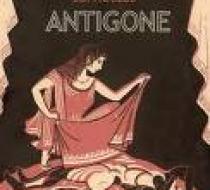Antigone Favorite
Antigone, written by Sophocles approximately 441 BC, is the third of the three Thebans plays. Antigone is the daughter of the infamous Oedipus and Jocasta. Thebes has suffered from a plague, scandal, and civil war. Antigone's brothers, Eteocles and Polyneices died fighting each other for the throne. Antigone's uncle, Creon, now king of Thebes, decrees that Eteocles will be buried, but Polyneices will not be given burial right. His body will be left for dogs and scavangers to feast on and he will be put to public shame. Antigone buries her brother against the edict of Creon, know that the penalty is death. she tries to convince her sister Ismene to help but she refuses. When questioned, Antigone proudly confesses her crime to Creon and argues her case unflinchingly. Creon orders Antigone to be buried alive in a cave. The blind profit Tiresias warns Creon that the gods would have punished him had Polyneices not been buried. Creon orders that Anitgone be released, but he is too late. She hangs herself and after her body is discovered by Haemon, her fiancé and Creon's son, he too commits suicide. Creon, devastated by this loss, sees the error in his tyrannical ways
This can be seen as an ancient example of civil disobedience. Antigone found Creon's law to be unjust, so she brook it knowing full well what the consequences are. By challenging Creon, she challenged the power of the state, placing individual beliefs of right and wrong above the law. Some productions of Antigone have linked the ancient story to more contemporary examples of tyranny. It has been reworked and used to represent modern examples rising up again a dictatorship.







